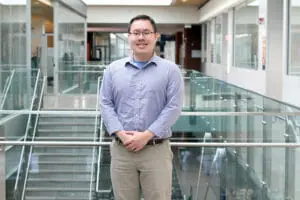
Biodesign researcher Dr. Efrem Lim began studying the human virome long before the arrival of SARS-CoV-2 and the global pandemic. His innovative use of high-throughput viral sequencing and functional studies of viral components have given him a keen insight into the trajectory of the current crisis.
Much of Lim’s recent focus has been on genomic surveillance studies of SARS-CoV-2 and its emergent variants. The pace of this research is accelerating with the announcement of three important grants.
The Arizona Department of Health Services has announced a $7.1 million award: Monitoring Sequence Variation of SARS CoV-2 in Arizona. Lim is joined by co-PIs Dr. Joshua LaBaer and Vel Murugan , Director and Associate Director of the Biodesign Center for Personalized Diagnostics. LaBaer is also Executive Director of the Biodesign Institute.
Earlier, Lim and his colleagues sequenced the first SARS CoV-2 cases in Arizona and subsequently identified B.1.243.1, a homegrown variant of the virus containing E484K, a mutation in the virus’ spike protein known to reduce neutralization by post-vaccination blood transfusion and monoclonal antibody therapeutics.
The Arizona variant has since spread to Texas and New Mexico. The new project will continue Lim’s statewide surveillance efforts, including the sequencing of vaccine breakthrough events.
The novel coronavirus continues to evolve as the pandemic moves forward, aquiring and selecting for new, advantageous mutations along the way. Epidedmiologists, virologists and public health officials have been heavily focused on the Alpha, Beta, Delta and Gamma variants, which the CDC has deemed “variants of concern.”
Such research will be crucial for tracking the spread of new cases in the state, particularly in light of the swift ascendence of the Delta variant and will provide valuable information to help inform public health officials and guide pandemic planning strategies.
Despite the importance of variant investigation for determining the trajectory of the global pandemic, genomic surveillance studies to track SARS-CoV-2 evolution in the United States have been limited. The new grant will enable real-time tracking of SARS-CoV-2, an essential component for the design and implementation of public health initiatives, diagnostics and vaccine development. Additionally, improved tools for reporting and making use of genomic data on the ground will be developed.
“We are performing next-generation sequencing of SARS-CoV-2 genomes from positive samples tested at the ASU Biodesign Institute’s CLIA-certified testing laboratory (ABCTL) and regional hospitals,” Lim says. “The ABCTL is a major SARS-CoV-2 testing site for communities throughout the state of Arizona. Since the sequencing and testing laboratories are on-site at the Biodesign Institute, we have rapid turn-around sequencing capabilities. Additionally, COVID-19 cases from multiple hospitals are being sequenced to understand variants that are clinically relevant that may be implicated in severe COVID-19 disease.” Such studies are used to inform state and federal public health responses and policies.
An additional grant of $750K for National tracking of SARS-CoV-2 mutations is being provided by Centers for Disease Control and Prevention (CDC). The project will involve the development of real-time tools for the analysis of SARS-CoV-2 in communities across the United States. The technology is designed to provide an early warning system that can be used to detect emergent trends, as the virus continues to evolve.
Finally, a third grant of $125K, will fund a collaboration with Dr. Purna Kashyap, from the Gut Microbiome Laboratory, Mayo Clinic Rochester. The study, Understanding gastrointestinal disease in COVID-19, will explore so-called long haulers—patients infected with SARS-CoV-2 who experience prolonged symptoms from COVID-19. In particular, the investigation will focus on persistent gastrointestinal symptoms following viral infection, a topic about which little is currently known. The research will include infectivity studies performed at the Biodesign Institute’s Biosafety Level 3 laboratory.